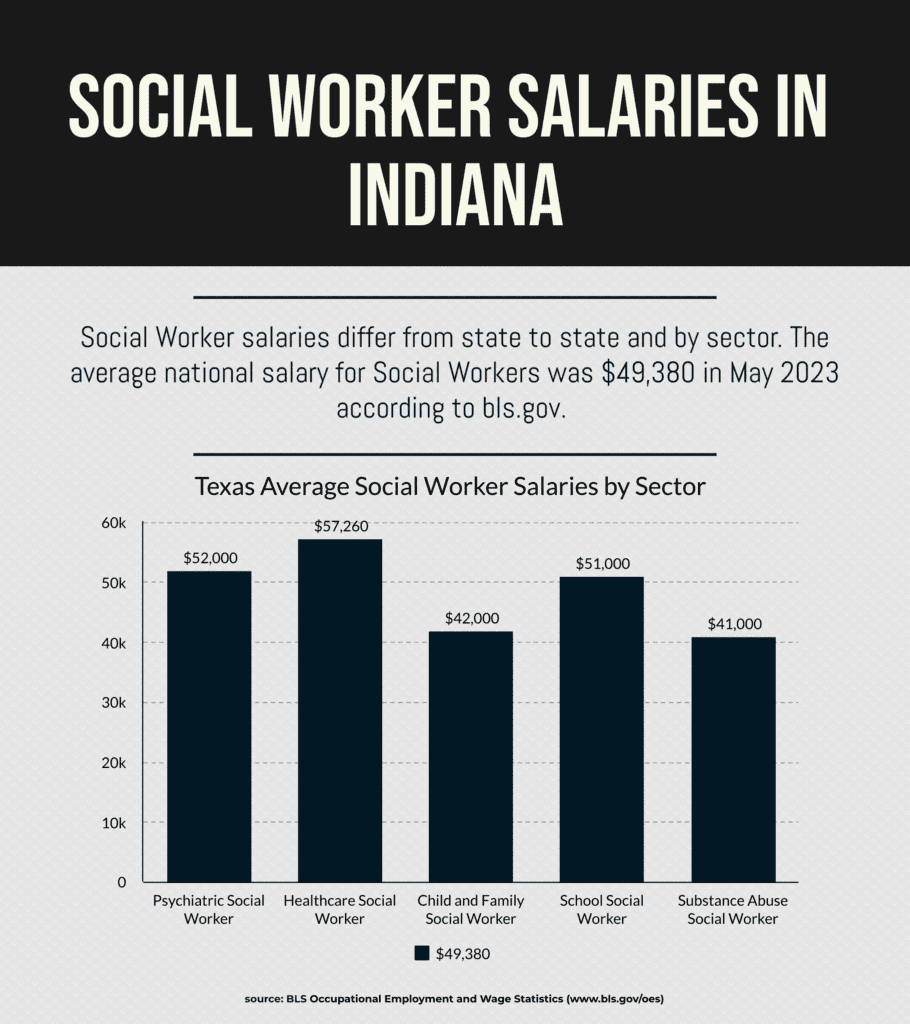
Indiana Social Work license, education, and employment information for anyone interested in a career in Social Work in this State.
Indiana is a midwestern state located in the Great Lakes region of the United States. With a population of around 6.7 million people, it is the 17th most populous state in the country. Known as the “Crossroads of America,” Indiana boasts a diverse economy that includes manufacturing, agriculture, pharmaceuticals, and technology.
The state’s largest city, Indianapolis, serves as the capital and is renowned for its lively sports culture, hosting popular events like the Indianapolis 500 and the NFL’s Indianapolis Colts. The city is also home to several prominent universities and cultural centers.
Indiana offers a mix of urban and rural landscapes, with picturesque countryside, beautiful lakes, and vibrant cities. The Hoosier National Forest provides many opportunities for outdoor activities such as hiking, fishing, and camping. The state’s diverse climate includes hot summers and cold winters, making it an attractive destination for all seasons.
Indiana is rich in history and culture, with various museums and historical sites that preserve its heritage. The Amish communities in the northern part of the state offer a unique glimpse into traditional, rural life.
Overall, Indiana is a state that offers a harmonious blend of industry, sports, natural beauty, and cultural richness, making it a vibrant and appealing place to live and visit.
What Are the Social Work Education Requirements in Indiana?
To become a licensed social worker in Indiana, you need to meet certain educational requirements. Typically, these requirements include:
Associate in Social Work (AA or AS):
An Associate in Social Work is the minimum educational requirement, and a professional who assists licensed social workers in providing support and services to individuals and communities. Social workers typically hold a two-year degree in social work and work in a variety of settings, such as hospitals, schools, social service agencies, and government organizations to further professional development. Associate social workers may engage in tasks such as conducting assessments, developing treatment plans, providing counseling, advocating for clients, and coordinating resources. Social workers play a crucial role in helping clients navigate social systems and improve their overall well-being.
Bachelor’s Degree In Social Work:
A Bachelor of Social Work (BSW) is an undergraduate degree program that prepares individuals for a career in social work. It typically takes four years to complete and provides a foundation of knowledge and skills necessary for working in the field of social work. BSW programs often include coursework in areas such as human behavior, social policy, research methods, diversity and social justice, and field practicum experiences. Graduates with a BSW may work in a variety of settings, including hospitals, schools, non-profit organizations, and government agencies, providing direct services to individuals, families, and communities.
Master’s Degree In Social Work :
A Master of Social Work (MSW) is a professional graduate degree that equips individuals with the knowledge and skills needed for advanced social work practice. It typically takes around two years to complete and involves in-depth coursework, field placements, and research. MSW programs often offer concentrations or specializations in areas like clinical social work, community development, policy and advocacy, or administration. Graduates with an MSW are qualified for clinical social work positions, leadership roles in organizations, program development and evaluation, policy analysis and development, and research. Social workers help individuals, families, groups, and communities address social issues, improve well-being, and advocate for social justice.
Doctoral Degrees in Social Work:
A Doctoral Degree in Social Work is the highest level of education in the field of social work. A doctorate degree is a research-focused degree in social work that prepares individuals for advanced practice, teaching, research, and leadership roles in the field. Doctoral programs in social work typically require several years of coursework, independent research, and a dissertation. Graduates with a doctoral degree often pursue careers in academia, research institutions, government agencies, or private practice. They may contribute to the development of social work theory and practice, conduct research to address social issues, and teach the next generation of social work professionals.
CSWE Accreditation:
CSWE (Council on Social Work Education) Accreditation is a recognition granted to social work programs that meet or exceed the standards set by the CSWE. It ensures that the program provides quality education and prepares students for entry-level social work practice. Institution Accredited programs undergo a rigorous evaluation process to assess their curriculum, faculty qualifications, student support services, and field education opportunities. Having CSWE Accreditation is important for social work programs as it indicates their adherence to standards and helps with professional licensure and employment opportunities for graduates.
What Are the Social Work Licensing Requirements in Indiana?
The social work licensing requirements in Indiana are regulated by the Behavioral Health and Human Services Licensing Board. To become a Licensed Social Worker (LSW), individuals must hold a Bachelor’s degree in social work from a CSWE-accredited program, complete 4000 hours of supervised work experience, and pass the ASWB Bachelor’s examination. To become a Licensed Clinical Social Worker (LCSW), individuals must hold a Master’s degree in social work from a CSWE-accredited program, complete 4000 hours of supervised clinical work experience, and pass the ASWB Clinical examination.
Licensed Bachelor Social Worker (LBSW) – A Licensed Bachelor Social Worker (LBSW) is a professional who has obtained a bachelor’s degree in social work and has met the licensing requirements set by their state. They are qualified to provide social work services such as case management, support, advocacy, and resource coordination to individuals, families, and communities. LBSWs work under the supervision of a licensed social worker or other qualified professional to ensure the highest level of care for their clients.
A Licensed Graduate Social Worker (LGSW) – A Licensed Graduate Social Worker (LGSW) is a professional in the field of social work who has obtained a master’s degree and has met the licensing requirements set by their state. LGSWs have completed the necessary education and supervision to practice social work independently or under the supervision of a licensed social worker, depending on state regulations. They provide a range of social work services, including assessment, counseling, advocacy, case management, and resource referral, to individuals, families, and communities. LGSWs work in various settings, such as hospitals, schools, and social service agencies, to support and improve the well-being of their clients. Social work license reciprocity.
A Licensed Independent Clinical Social Worker (LICSW) – A Licensed Independent Clinical Social Worker (LICSW) is a specialized and advanced level of social work licensure. LICSWs have met the education, supervised clinical experience, and exam requirements set by their state licensing board of indiana behavioral health. They have the knowledge and expertise to diagnose and provide therapy for health disorders, as well as offer counseling and therapeutic interventions to individuals, families, and groups. LICSWs often work in private practice, hospitals, mental health clinics, or other clinical settings, providing comprehensive mental health services and addressing complex social and emotional issues.
You can find careers, professional development or get continuing education in Any of the following:
- client health services
- school social workers
- clinical practice
- independent private practice
- clinical nurse specialist
- addiction counseling services
- Behavioral health and human services
- clinical addiction counselor
- marriage and family therapist
- behavioral health professional
- practice clinical social work
- professional social work practice
- advanced management practice
- mental health nursing
How Long Does It Take To Become A Social Worker In Indiana?
The time it takes to become a social worker in Indiana depends on the level of education pursued and the licensing requirements of the state. Here is a breakdown of the typical timeline:
- Bachelor’s in Social Work (BSW): It typically takes four years to complete a BSW program. However, some programs may offer accelerated options or part-time study, which can affect the overall duration.
- Master’s in Social Work (MSW): After obtaining a BSW or a bachelor’s degree in a related field, a graduate education usually takes two years of full-time study. Part-time and online options may be available, but the overall duration may be longer.
- Supervised Work Experience: To become a Licensed Social Worker (LSW) or a Licensed Clinical Social Worker (LCSW), individuals must complete a certain number of supervised work experience hours. The specific number of hours and duration of this experience varies depending on the license sought. For example, Indiana requires 4000 hours of supervised work experience for LCSW licensure.
- Licensing Exams: After completing the required degree and supervised work experience, individuals must pass the appropriate licensing exam. This includes the ASWB Bachelor’s exam for LSW and the ASWB Clinical exam for LCSW.
- Continuing education
Given these factors, the time it takes can depend on the route you take. Continuing education will be ongoing. You will also get a criminal background check to obtain indiana social work licensure
How Much Do Social Workers Make In Indiana?
The average salary of social workers in Indiana varies based on experience, education, and type of employment. According to data from the Bureau of Labor Statistics, as of May 2022, the annual mean wage for social workers in Indiana was $49,380. The lowest 10% earned less than $31,080, while the highest 10% earned more than $75,900. It’s important to note that these figures are estimates and can vary depending on factors such as location, specialization, and setting.

More about these Social Work Jobs:
- Child and Family Social Worker: They work with families and children in various settings to provide support, counseling, and intervention services.
- School Social Worker: They work in educational settings to support students’ academic success and provide counseling and resources for social and emotional issues.
- Medical Social Worker: They work in healthcare settings, such as hospitals or clinics, to provide support and assistance to patients and their families during medical treatment.
- Mental Health Therapist: They provide counseling and therapy services to individuals with mental health concerns, working in various settings like community mental health centers or private practice.
- Substance Abuse Counselor: They work in substance abuse treatment centers, counseling individuals struggling with addiction, and providing resources for recovery.
Related:

